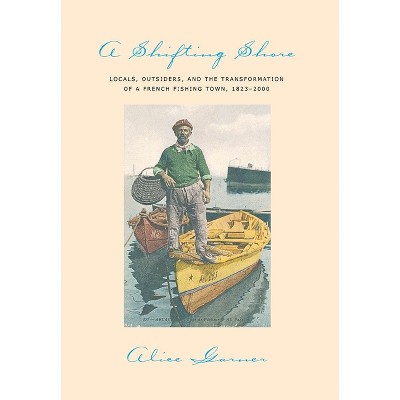About this item
Highlights
- In the Museum of Man offers new insight into the thorny relationship between science, society, and empire at the high-water mark of French imperialism and European racism.
- About the Author: Alice L. Conklin is Professor of History at The Ohio State University.
- 392 Pages
- History, Europe
Description
About the Book
This book offers new insight into the thorny relationship between science, society, and empire at the high-water mark of French imperialism and European racism.
Book Synopsis
In the Museum of Man offers new insight into the thorny relationship between science, society, and empire at the high-water mark of French imperialism and European racism. Alice L. Conklin takes us into the formative years of French anthropology and social theory between 1850 and 1900; then deep into the practice of anthropology, under the name of ethnology, both in Paris and in the empire before and especially after World War I; and finally, into the fate of the discipline and its practitioners under the German Occupation and its immediate aftermath.Conklin addresses the influence exerted by academic networks, museum collections, and imperial connections in defining human diversity socioculturally rather than biologically, especially in the wake of resurgent anti-Semitism at the time of the Dreyfus Affair and in the 1930s and 1940s. Students of the progressive social scientist Marcel Mauss were exposed to the ravages of imperialism in the French colonies where they did fieldwork; as a result, they began to challenge both colonialism and the scientific racism that provided its intellectual justification. Indeed, a number of them were killed in the Resistance, fighting for the humanist values they had learned from their teachers and in the field. A riveting story of a close-knit community of scholars who came to see all societies as equally complex, In the Museum of Man serves as a reminder that if scientific expertise once authorized racism, anthropologists also learned to rethink their paradigms and mobilize against racial prejudice--a lesson well worth remembering today.
Review Quotes
In the Museum of Man is provocative in that it implicitly invites scholars to treat 'science' not so very differently from the way in which we treat magic. This invokes the big question of human history: why do people believe what they believe; what instruments do people with special knowledge use in order to demonstrate their beliefs 'work'?
--Julia Fein "Ab Imperio"Conklin's history of French anthropology/ethnology is a very welcome addition to the history of the field, a subtle, detailed, and fine-grained account of the development--in some cases the underdevelopment--of the discipline in the colonial era. She focuses in particular on changing and contested ideas of 'race.' Indeed, anthropology emerged in nineteenth-century France as an elaboration of biological 'race science' under the aegis of Paul Broca, who endeavored to demonstrate European biological superiority through the rigorous comparative analysis of skeletal remains. Paradoxically, Broca's very rigor ultimately doomed the enterprise.
-- "The International Journal of African Historical Studies"Alice Conklin's In the Museum of Man: Race, Anthropology, and Empire in France, 1850-1950 introduces scholars to the hundred-year history of individuals, networks, and institutions in French intellectual life that culminated in French ethnologists' active role in UNESCO's 1950 statement [that race is a social construct]....In the Museum of Man is provocative in that it implicitly invites scholars to treat 'science' not so very differently from the way in which we treat magic.
--Julia Feinn "Ab Imperio"Alice L. Conklin's tightly-woven narrative...frankly confronts the occasionally disturbing nuances of the very human choices made by researchers driven to better understand humanity and human interactions. Using an impressive array of archival texts (a term she extends to physical objects and photographs) Conklin is masterful in her exploration of how race, racism and ethnology were redefined by the men and women who created the Museum of Man (Le Musee de l'Homme) between the two world wars. Conklin's book is a powerfully told story of this evolution and its hiccups, and therefore of the scientific roots of race, racism, colonialism, anticolonialism and antiracism in the twentieth century, and is well worth reading.
--Jennifer Ann Boitin "European History Quarterly"Conklin explores how race and empire functioned within anthropology in different times and in different contexts from 1850 to 1950. The resulting narrative is complex, nuanced, deeply researched, and ultimately fascinating. Organized more or less chronologically, the seven chapters of this book interweave intellectual, cultural, and political history as Conklin examines the works of the main French anthropologists, the institutions that housed them (laboratories, museums, and schools) and the contexts (political and academic) that framed their projects.
--Camille Robeis "The Journal of Modern History"Conklin reconstructs this history with subtlety, and she writes with verve. Her footnotes and bibliography document her deep archival research and vast secondary reading. She touches upon developments in many of the human sciences: philology and linguistics, ancient religions, art, history, archaeology, and museography. She also discusses how the transformations of German, British, and U.S. anthropology were in transnational dialogue with the French...Conklin writes for scholars who can and must make..connections themselves, offering us an opportunity to engage in self-reflection about how science and the core categories of our disciplines are always saturated in the politics of the present.
--Jonathan Judaken "American Historical Review"This masterfully researched study examines the transformation of French anthropology, including its institutionalization and professionalization.... As Conklin makes clear in this thorough and highly valuable study, the vestiges of belief in racial hierarchy did not disappear, but the intellectual circles of Rivet and Mauss helped bring it into disrepute.
--Martin S. Staum "Isis Journal"About the Author
Alice L. Conklin is Professor of History at The Ohio State University. She is the author of A Mission to Civilize: The Republican Idea of Empire in France and West Africa, 1895-1930, coauthor of France and Its Empire since 1870, and coeditor of European Imperialism: 1830-1930: Climax and Contradictions.
Shipping details
Return details
Trending Non-Fiction












